Updated: January 2025 | Author: Dr. Khushbu Jain | Reviewed by: Dr. Anant Bagul (Orthopedic surgeon and stemcell specialist)
An Indian diet for autism can make a real difference in your child’s development and well-being.
If you’re a parent wondering whether the right nutrition can truly make a difference in your autistic child’s life, you are walking in the right direction.
Autism Spectrum Disorder (ASD) often comes with unique nutritional challenges, such as sensitivities to certain foods and the need for specific nutrients. Understanding the role of diet in improving focus, communication, and overall well-being is essential.
With the right Indian diet for autism, you can provide your child with the nourishment they need to thrive.
These foods will help boost brain health, improve digestion, and provide necessary nutrients for their overall growth. Let’s check them in detail.
Foods That An Autistic Child Should Avoid
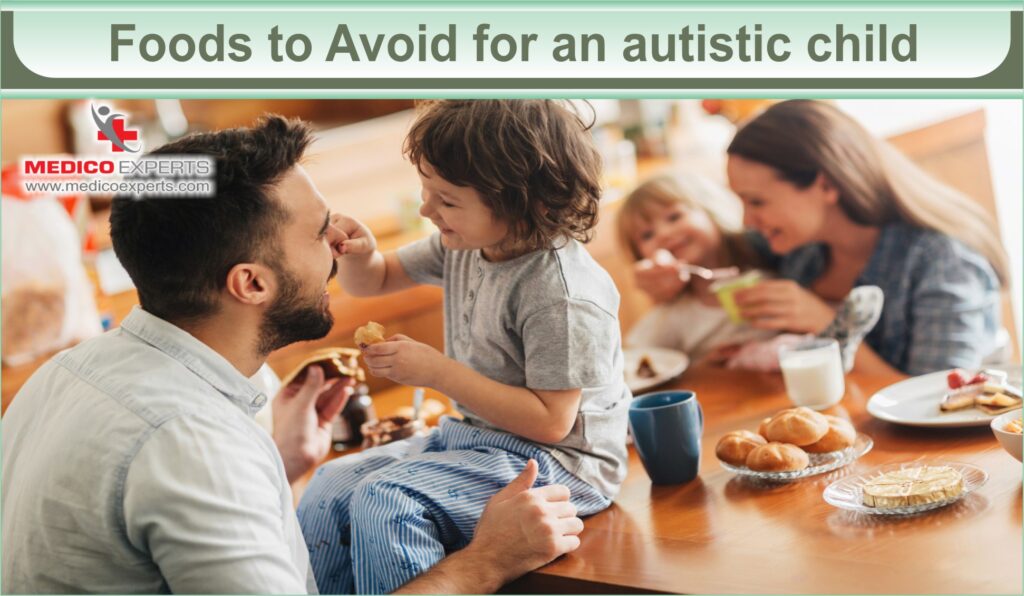
When creating a diet for your autistic child, it is essential to identify beneficial foods that promote their overall growth and avoid those that may compromise their health and well-being, hindering their development.
Here’s a concise list of foods that could impact sensory sensitivities and overall well-being for children on the autism spectrum.
1. Gluten-Free and Casein-Free Diet
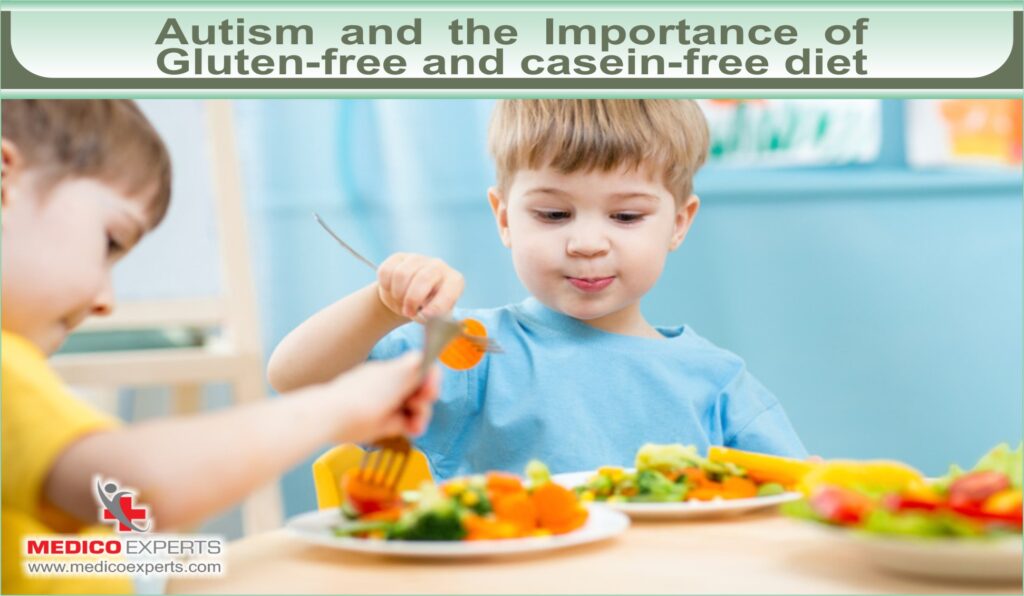
Autism is a neurodevelopmental disorder in which the child becomes extra sensitive or less sensitive to sounds, textures, lights, and smells. Autistic children are often sensitive to gluten and casein.
Gluten-free food includes food that is not derived from wheat or barley. The casein-free (rice, soy, or potato-based milk pareve) diet includes food that does not contain milk protein.
Gluten-rich and casein-rich food may interact with folic acid absorption and increase neurodevelopmental weakness symptoms in autistic children.
Moreover, the casein protein may cause gastrointestinal problems in autistic children who are prone to digestive problems and may not be able to digest milk products easily.
Children like cheese, flavoured yoghurt, and chocolate milkshakes, but all these items may be avoided, as they are a rich source of casein protein.
2. Avoiding Artificial Ingredients, Mercury, and Polyvinyl Compounds
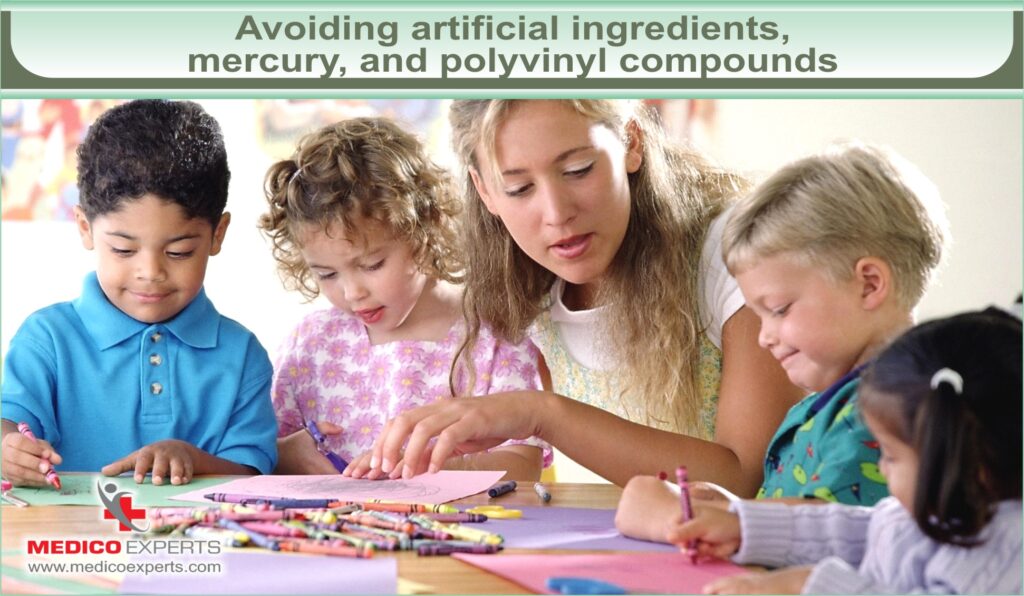
Artificial ingredients in food, like additives, preservatives, added colors, and flavors, are not good for health, and these ingredients also slow down growth.
Some foods, like red meat and sea fish, may also contain mercury, which can be toxic for autistic children.
Vegetables may have pesticides like polyvinyl compounds, so it is extremely important to wash and clean them thoroughly before cooking.
3. Junk and Deep-Fried Foods

Autistic children are sensitive to different smells, tastes, and textures of food. They may not like a ripe banana, but they may love crispy chicken or burgers.
But these junk foods may cause issues with sensory sensitivities, digestive problems, and nutritional imbalances.
4. Sugar, Artificial Sweeteners, and Monosodium Glutamate (MSG)
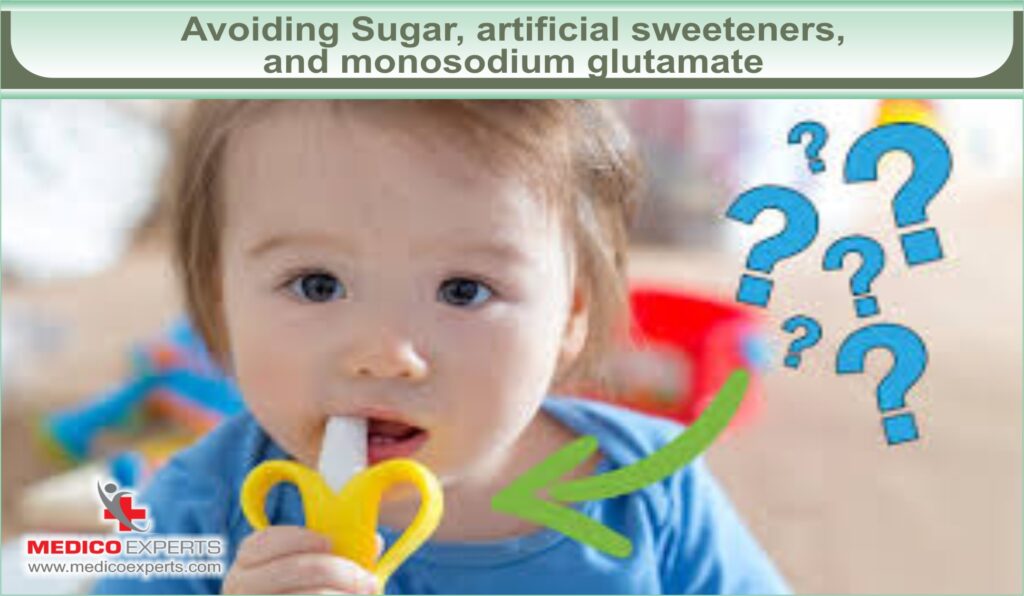
Sugars and artificial sweeteners can trigger hyperactivity in autistic children. They can even worsen the hyperactivity behavior in children by stimulating the pathways in the brain that cause hyperstimulation.
Monosodium glutamate, present in Chinese food, can also cause intense hyperactivity in autistic children.
Best Foods for Autism Recovery
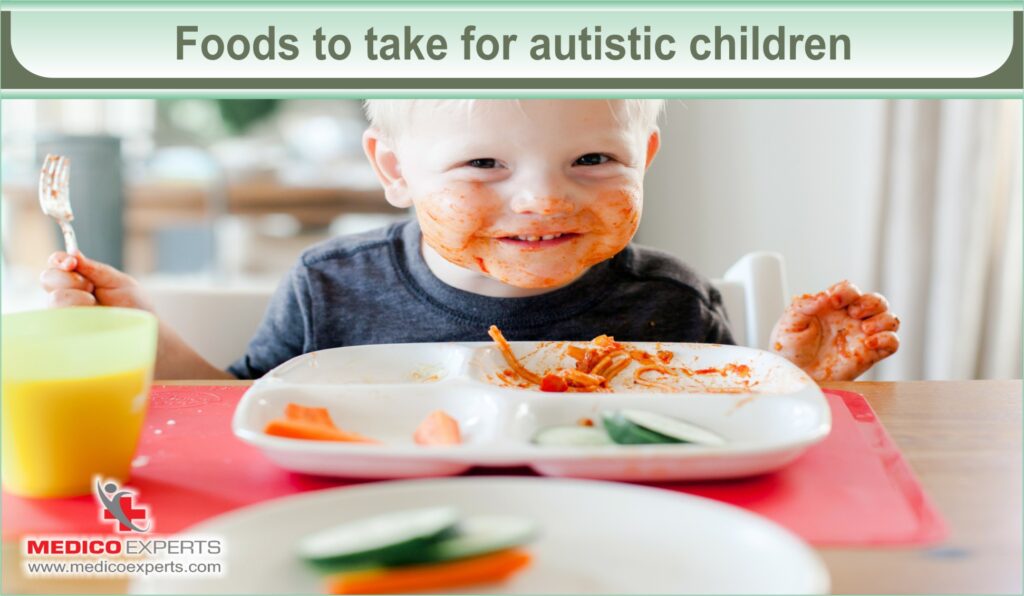
Let’s shift our focus to foods that can support the development and health of autistic children. These foods address specific nutritional needs and promote brain function.
1. Probiotic Foods for Autistic Children
Probiotics are useful bacteria, like Lactobacillus and Bifidobacterium, that produce essential amino acids, neurotransmitters, and short-chain fatty acids, which are all essential for the proper functioning of the brain.
Moreover, probiotics also enhance the circulation of brain-derived neurotrophic factors, which are essential for brain and central nervous system function. Probiotics also help in digestion and proper stool formation by colonizing the intestine with beneficial bacteria.
Examples of probiotic food include curd and fermented food like idlis and dhoklas, which are good for the neuro and gastrointestinal health of the autistic child.
2. Food Rich in Magnesium and Vitamin B6
Bananas, fish, and peanuts are rich in vitamin B6 and spinach, cashews and almonds are rich in magnesium.
Both vitamin B6 and magnesium are important for speech development and improving communication skills.
3. Foods that are Rich in Zinc and Vitamin C
Zinc and vitamin C are essential for the pregnant mother as well as for autistic children after their birth.
When the baby starts eating food, the child should be provided with a vitamin-rich diet, such as lemons, oranges, papayas, and pineapples, and zinc-rich food, such as eggs, legumes, and seeds.
4. Food Rich in Omega-3 Fatty Acids
Omega-3 fatty acids are very good for the proper functioning of the brain. Walnut and cod liver oil are rich sources of omega-3 fatty acids and should be provided to the autistic child.
5. Fiber-Rich Foods
Vegetables and fruits rich in fiber (such as apples, guavas, and whole-grain chapati) should be given to autistic children who tend towards constipation. Moreover, proper water intake and physical activities are required to prevent constipation.
Sample Indian Diet Plan for an Autistic Child
Here’s a detailed Indian diet plan for autistic children that incorporates the best foods while avoiding harmful ones.
Early Morning: Warm water + almonds and walnuts.
Breakfast: Scrambled eggs with whole-grain bread + fruit salad (banana, apple, and orange).
Mid-Meal: Fresh orange juice + papaya slices + dhokla.
Lunch: Pea pulao + rajma + mixed vegetable soup.
Evening: Herbal tea (without milk and sugar) + kala chana chaat. Dinner: Ragi chapati + vegetable kofta + fresh vegetable soup.
Why Consult a Dietitian for Autism?
While gluten-free and casein-free diets are popular, some medical professionals warn against excluding wheat and dairy without expert advice, as these exclusions may lead to nutritional deficiencies.
For a personalized Indian diet plan for an autistic child, consulting an experienced dietitian ensures balanced nutrition and effective dietary interventions. Remember, diet alone cannot address all symptoms of autism. Combining dietary changes with proper medical treatment offers a holistic approach to autism care.
Combination Therapy for Autism: Beyond diet
The focus and approach of each medical science are different. They often fail to deliver predictable results in a defined time frame on a standalone basis.
MedicoExperts’ combination therapy brings together Ayurveda, homeopathy, advanced regenerative medical science, and ABA therapy. By combining the strengths of these medical sciences, we can achieve results that no single therapy can provide on a stand-alone basis.
While proper nutrition supports brain function and reduces digestive issues, comprehensive care includes behavioral therapies for skill development, medical treatments for underlying health issues, natural remedies for overall balance, and nutritional support for optimal brain function.
This approach addresses autism from multiple angles and gives your child the best chance for improvement and development.
Takeaway
Giving your child the right Indian diet for autism can make a meaningful difference in their well-being. Avoid problematic foods like gluten, casein, and artificial additives while incorporating nutrient-rich options like probiotics, omega-3s, and fiber.
However, every child is unique, and dietary needs vary. Consulting a dietitian ensures the best outcomes for your child’s health and development. Combination therapy, along with an appropriate diet, can give the best results and amplify and speed up the improvements.
Frequently Asked Questions (FAQs):
Q1. What is the ideal diet for autism?
The ideal food for autism is probiotics, gluten and casein-free food, and food rich in vitamins, minerals, and omega-3 fatty acids.
Q2. What foods help recover from autism?
Food alone cannot help recover from autism. Medical treatment, along with nutritious food, can quicken the recovery process.
Q3. Are there any Indian vegetarian options for autism diets?
Yes, foods like idli, dhokla, lentils, spinach, and walnuts are excellent vegetarian choices.
References
Medically Reviewed by MedicoExperts Editorial & Clinical Review Board on 9 September 2025
Medical Disclaimer: This content is for informational purposes only and should not replace professional medical advice, diagnosis, or treatment. Always consult a qualified healthcare provider or dietitian before making significant dietary changes for an autistic child. Individual needs and responses to dietary interventions may vary.



